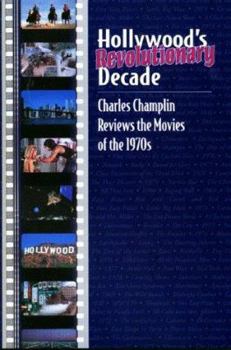Hollywood's Revolutionary Decade
Select Format
Select Condition 
Book Overview
With all the upheaval of the 1970s -- social, political, sexual, and psychological -- it's no wonder at the movies of that decade broke new ground. To the degree that the arts reflect their times, the... This description may be from another edition of this product.
Format:Paperback
Language:English
ISBN:188028426X
ISBN13:9781880284261
Release Date:January 1998
Publisher:Daniel & Daniel Publishers
Length:189 Pages
Weight:0.75 lbs.
Dimensions:0.5" x 6.0" x 9.0"
Related Subjects
Arts, Music & Photography Guides & Reviews Humor & Entertainment Movies Performing ArtsCustomer Reviews
1 rating
" . . . a kind of dangling participle of an art"
Published by Thriftbooks.com User , 18 years ago
". . . dependent on the art it was criticizing." These are the most enjoyable pieces of film criticism I've read in a long time. Champlin reviews the best films released between the end of the Production Code era (which also saw the death of the Hollywood Blacklist) and the beginning of the blockbuster/comic-book film era. Champlin's emphasis is on the "revolutionary" films - - movies that talked back to society in the language real people used about the subjects they were actually obsessed with. What Champlin says about Shampoo applies to most of the movies in the book: "It is . . . a chilling, hard, unsentimental . . . piece of social reporting which will be worth studying a century from now to know what a part of our times was like." Champlin's short essays (serious but readable criticism, not thumbs up/thumbs down reviews), published as he wrote them at the time, are remarkable for how he saw what was important about these movies before the conventional wisdom about their quality took hold. The book is one of the few about movies where, just glancing at the contents page, I realized I'd seen almost all the films when they were originally released. Another neat thing I found (and shared) was the soft spot Champlin had for movies like Earthquake and The Towering Inferno, the last gasp (or explosion) of the old-fashioned special effects/big cast soap opera movie. Independence Day was just around the corner. What Champlin writes about "Young Steven Spielberg," was observant at the the time (and as far as I'm concerned still true): Spielberg "shows as he has before an uncommon flair for handling big action" but "Intimacy is not yet his strength." In his review of Kubrick's A Clockwork Orange, Champlin outlines the differences between Anthony Burgess's novel and the movie (which over time really infuriated Burgess) better than anything else I've read about how the book became a film. Kubrick's films were often darker than the books they were based on. Even in 2001: A Space Odyssey, Kubrick's human characters are more dark than the hopeful scientists in most of Arthur C. Clarke's fiction - - but Clarke has never seemed to mind. Read Hollywood's Revolutionary Decade. Especially if you saw these movies when they came out. For one thing, it will show how certain writers and directors, like Robert Towne and Hal Ashby, made so many great movies in such a short time. Thinking about these movies again, in light of films that have followed, is both satisfying and disturbing.





